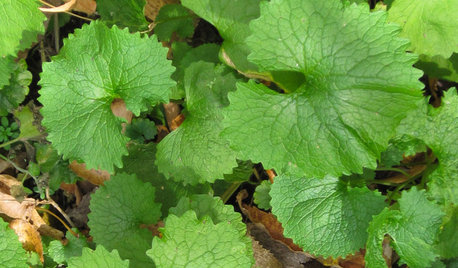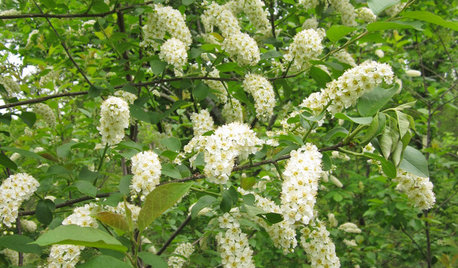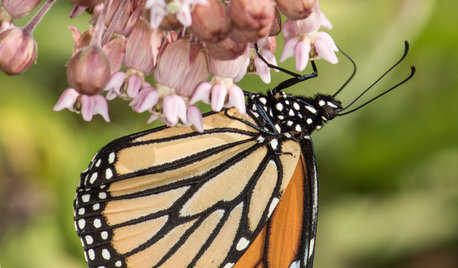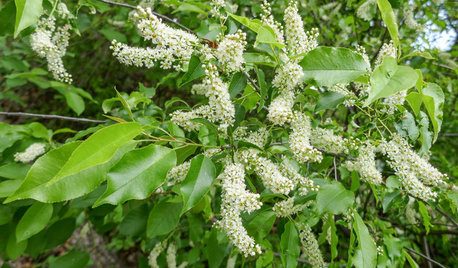gardening nightmare, help - invasive black raspberry
tailzzz24
12 years ago
Featured Answer
Sort by:Oldest
Comments (31)
hosenemesis
12 years agolast modified: 9 years agoianna
12 years agolast modified: 9 years agoRelated Discussions
Are raspberries and blackberries invasive?
Comments (17)Don't plant any "wild" blackberries, like himalayan, which is one of the scourges of the NW. Himalayan blackberries are certainly what vixenmoon is talking about, and most likely greenwitch and painterbug too. However, most cultivated types are not nearly as vigorous and spreading as this invasive species. (Don't buy tayberries, which taste sinful, but they are himalayans in disguise!) Thornless varieties are far easier to handle. For blackberries, which tip-root, look for upright habit, which will not have nearly the tendency to tip-root as the vining types. Commercial farms mow along the rows to keep down volunteers of raspberry, since they creep underground. Or you could use bamboo barrier around a raspberry. I have not had a problem with seed volunteering from my cultivated blackberries and raspberries, unlike the himalayan blackberry, which seeds itself regularly. Blackberries and raspberries are so delicious, don't let the unrulyness of the wild types discourage you. There are varieties you can buy and preventative measures you can take to not have to worry about them taking over....See MoreMy 1st experience with gardening is turning into a nightmare... HELP!
Comments (4)Thanks for the info. The slimy mud dried out mostly by the next day. When I stuck my finger a couple inches in the soil it just felt cool/damp but not wet so I'm assuming that means it's draining well? When I started the soil was dry like cement as you described. Now it's a more loose & workable. I live on a friend's property, they no longer have horses but do have llamas. She said their poop (which looks like lima beans) makes great fertilizer so I'll gently work some "Llama beans" into the soil in the next week or 2. Somebody pointed out that it sounded like I was "loving" the raspberries to death so I'm going to leave them alone for now and only water them every 2-3 days instead of daily. As far as the peppers go I had no idea about the frost thing. My friend planted her tomatoes the same time as I planted my peppers and her plants are growing no problem.... so maybe over watering is/was part of the problem too? I think I'll just dig up the dead plants and go buy a couple of new ones from Lowe's acclimate them over a whole week instead of only a day and then see how they do once planted. Luckily my strawberry & zucchini plants seem to be holding up ok so I guess that makes my garden only a 50% failure LOL...See More1st time gardening & it's turning into a nightmare... HELP
Comments (3)Thanks for the info. No there is no water pooling or floating on top but when I stepped in the garden my foot sank about 2 inches into the soil so it's totally saturated like Mudd. I'll leave the berries along for now and just check the soil with my finger and do nothing until the soil doesn't feel damp. As far as the peppers are concerned if I dug up all the dead plants being careful not to injure the few survivors is it NOW warm enough to buy some more pepper plants and try again? It's been close to 90 degrees during the day so I doubt it drops all the way down to below 45 at night.... thoughts?...See MoreHELP! 1st gardening experience is a nightmare. No idea what I'm doing!
Comments (1)use the search... link...See MoreTiffany, purpleinopp Z8b Opp, AL
12 years agosilverkelt
12 years agolast modified: 9 years agotailzzz24
12 years agolast modified: 9 years agobeachgrub
12 years agolast modified: 9 years agoflowergirl70ks
12 years agolast modified: 9 years agotailzzz24
12 years agolast modified: 9 years agoianna
12 years agolast modified: 9 years agotailzzz24
11 years agolast modified: 9 years agohosenemesis
11 years agolast modified: 9 years agoianna
11 years agolast modified: 9 years agotailzzz24
11 years agolast modified: 9 years agoislanddevil
11 years agolast modified: 9 years agoUser
11 years agolast modified: 9 years agoianna
11 years agolast modified: 9 years agothestarliteavatar
8 years agoianna
8 years agothestarliteavatar
8 years agocziga
8 years agoianna
8 years agoGardenHo_MI_Z5
8 years agoUser
7 years agoMary Leek
7 years agoianna
7 years agoMary Leek
7 years agoGardenHo_MI_Z5
7 years agoJill
7 years agoRachel Petersen
7 years agoMary Leek
7 years ago
Related Stories

GARDENING GUIDESDo You Have This Invasive Plant in Your Yard?
Garlic mustard is spreading across the U.S. Here’s how to spot it and what to do
Full Story
TREESNative Plant Alternatives to Invasive Common Buckthorn
Learn how to identify and control this aggressive plant, and what to grow in its place
Full Story
FLOWERS AND PLANTSHelp Monarchs and Other Butterflies by Planting Common Milkweed
Summer-blooming Asclepias syriaca is an important larval host plant for the monarch butterfly and attracts a number of pollinating insects
Full Story
LANDSCAPE DESIGNNative Plants Help You Find Your Garden Style
Imagine the garden of your dreams designed with plants indigenous to your region
Full Story
GARDENING GUIDESPlant Black Cherry Trees for the Birds and Bees
Plant Prunus serotina in the Central and Eastern U.S. for spring flowers, interesting bark and beautiful fall color
Full Story
COLORPick-a-Paint Help: How to Quit Procrastinating on Color Choice
If you're up to your ears in paint chips but no further to pinning down a hue, our new 3-part series is for you
Full Story
ARCHITECTUREHouse-Hunting Help: If You Could Pick Your Home Style ...
Love an open layout? Steer clear of Victorians. Hate stairs? Sidle up to a ranch. Whatever home you're looking for, this guide can help
Full Story
MOVINGRelocating Help: 8 Tips for a Happier Long-Distance Move
Trash bags, houseplants and a good cry all have their role when it comes to this major life change
Full Story
MOST POPULAR9 Real Ways You Can Help After a House Fire
Suggestions from someone who lost her home to fire — and experienced the staggering generosity of community
Full Story
GARDENING GUIDES6 Plants That Beat Butterfly Bush for the Wildlife Draw
It's invasive, a nonnative and a poor insect magnet. Check out these better alternatives to butterfly bush in the garden
Full Story


tailzzz24Original Author